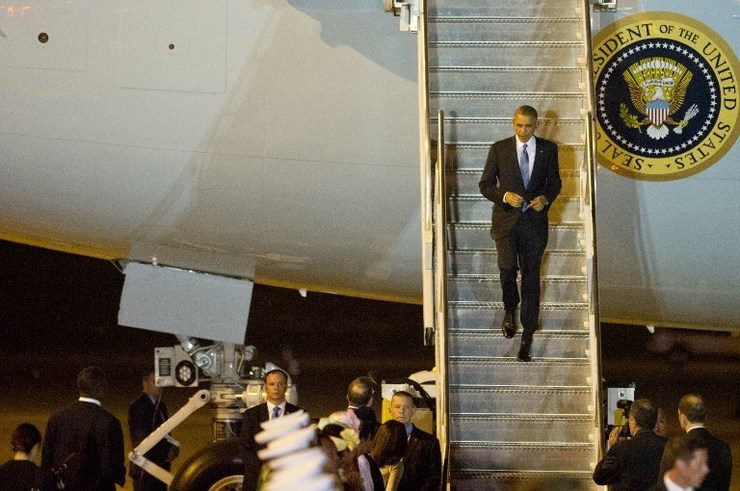SUMMARY
This is AI generated summarization, which may have errors. For context, always refer to the full article.

NAYPYIDAW, Maynmar – (UPDATED) US President Barack Obama landed in Myanmar Wednesday, November 12, as the once cloistered nation hosted its biggest gathering of world leaders since shedding junta rule, but concerns over the pace of democratic reforms surfaced immediately.
Obama, who will meet Southeast Asian leaders and attend the East Asia Summit in the purpose-built capital of Naypyidaw, signalled he would throw his political might into re-igniting the democratic process.
“In some areas there has been a slowdown in reforms, and even some steps backward,” Obama said in an interview with news website The Irrawaddy published just before he arrived on Wednesday night from China.
“In addition to restrictions on freedom of the press, we continue to see violations of basic human rights and abuses in the country’s ethnic areas, including reports of extra-judicial killings, rape and forced labour.”
Earlier, United Nations Secretary General Ban Ki-moon, also in Naypyidaw, highlighted the “serious humanitarian issue” of Myanmar’s displaced Muslim Rohingya minority.
Around 140,000 Rohingya languish in fetid camps after bouts of violence left scores of people dead – mostly from the Muslim group – in eastern Rakhine State.
Speaking to reporters, the UN chief urged Myanmar’s authorities to step back from moves which could deny citizenship to the minority group, vowing to press President Thein Sein for “easy access” for UN agencies to displacement camps.
Myanmar, which was swept into the diplomatic hinterland under decades of harsh military rule, has been gradually welcomed back into the international fold since the start of reforms in 2011.
Those saw the release of most political prisoners and the promise of free and fair polls next year.
The reforms have seen most sanctions lifted, while foreign investment has poured into the untapped market of some 50 million people.
Obama two years ago became the first sitting US president to visit Myanmar, in an initial effort to add momentum to the reforms.
Since then wrangles over the constitution, the cramping of media freedom as well as tinderbox issues such as ethnic rebellions and the anti-Muslim violence, have taken the sheen off Myanmar’s emergence onto the world stage.
In comments just days before Obama’s arrival, opposition leader – and fellow Nobel laureate – Aung San Suu Kyi sought to temper US “over-optimism” over the country’s progress.
Obama is set to meet Thein Sein in Naypyidaw, then with Suu Kyi in the economic hub of Yangon on Friday.
Trouble at sea
Earlier Wednesday the Association of Southeast Nations (ASEAN) held its leaders’ meeting in the culmination of Myanmar’s year-long chairmanship of the 10-member bloc.
Key issues discussed included the row between several ASEAN members and China over territory in the South China Sea, and greater economic integration ahead of a Southeast Asian trade union mooted for 2015.
A draft of the ASEAN leaders’ statement seen by AFP expressed “concerns over recent developments in the South China Sea, which have increased tensions in the area.”
Antagonism has soared with violent anti-China clashes breaking out earlier this year in Vietnam over Beijing’s activities in contested waters, while the Philippines has also expressed outrage at a series of manoeuvres and naval deployments by the regional superpower.
China says most of the South China Sea – including areas near the coast of rival claimants – is its territory.
The sea row has dogged regional relations for years, with Beijing reluctant to sign a binding, multilateral code of conduct covering disputes in the resource-rich waters.
A spokesman for Philippine President Benigno Aquino said ASEAN leaders on Wednesday again called for “a substantial fleshing out” of the process towards reaching the elusive code.
In the draft statement, the leaders also pledged to take “all necessary measures” to stop ASEAN nationals “travelling to join terrorist groups.”
Scores, possibly even hundreds, of people from Indonesia, the world’s largest Muslim country, and Malaysia have joined Islamic militants in Syria and Iraq.
ASEAN leaders are due to meet with Chinese Premier Li Keqiang on Thursday during the East Asia Summit, which groups the Southeast Asian bloc with the United States, China, India, Japan, South Korea, Australia, Russia and New Zealand. – Rappler.com
Add a comment
How does this make you feel?
There are no comments yet. Add your comment to start the conversation.